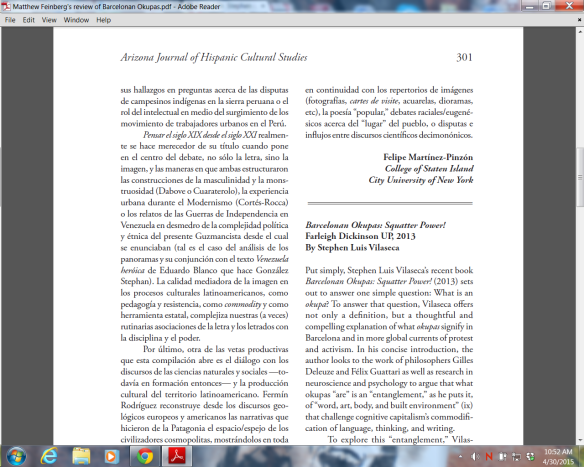Hispanist Matthew I. Feinberg reviews Barcelonan Okupas: Squatter Power! for the Arizona Journal of Hispanic Cultural Studies (requires subscription).
Dr. Feinberg’s review is complimentary, but more importantly insightful. He identifies in my book the importance of entanglement for the emergent urban body. Okupas, like graffiti and street artists, rehearse what a body is capable of in the material world.
Here’s the first and last paragraph of the review.
Put simply, Stephen Luis Vilaseca’s recent book Barcelonan Okupas: Squatter Power! (2013) sets out to answer one simple question: What is an okupa? To answer that question, Vilaseca offers not only a definition, but a thoughtful and compelling explanation of what okupas signify in Barcelona and in more global currents of protest and activism. In his concise introduction, the author looks to the work of philosophers Gilles Deleuze and Félix Guattari as well as research in neuroscience and psychology to argue that what okupas “are” is an “entanglement,” as he puts it, of “word, art, body, and built environment” (ix) that challenge cognitive capitalism’s commodification of language, thinking, and writing.
Throughout the book, Vilaseca’s work is most compelling when he is able to demonstrate how the textual becomes material and discusses the physical space of the city. It is here in the intermingling of the text and the city where Vilaseca sees okupas as being most impactful, and it is also the place where this author presents his most innovative analytic work. This study is a thoughtful and well-written contribution to the field that not only offers readers a careful analysis of what an okupa “is,” but demonstrates the ways that the embodied activism of okupas are attempting to rewrite the urban experience in Barcelona through the production, sharing, and “comonning”of culture—efforts that seek to use Squatter Power to undermine the rigid social relations produced by the post-fordist city.


